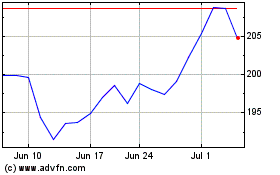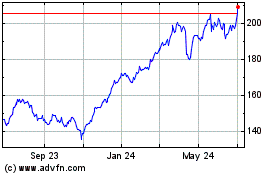By Orr Hirschauge in Tel Aviv and Nicole Hong in New York
To many in Tel Aviv's thriving tech community, Gery Shalon
appeared to be one of its most prosperous entrepreneurs.
Mr. Shalon lived in a multimillion-dollar home in the city's
affluent Savyon suburb, was involved in a number of businesses
offering Web trading platforms and online gambling, and cut a
striking figure as one of the industry's flashiest dressers,
according to property records, former employees and others who know
him.
Now, the 31-year-old sometimes called "Gabi the Georgian" sits
in a Haifa, Israel, jail accused of being the mastermind of one of
the largest cyberattacks on U.S. corporations in history.
Mr. Shalon, an Israeli citizen, was arrested in July at his home
and charged by U.S. authorities with taking part in a
stock-manipulation scheme. The charges were reported to be linked
to the hack last year of J.P. Morgan Chase & Co., but this
month U.S. prosecutors unsealed indictments describing a litany of
allegations both broader and more serious than previously
known.
Mr. Shalon and two others were charged with hacking into the
servers of a dozen companies, including J.P. Morgan and Dow Jones
& Co., the publisher of The Wall Street Journal, as part of a
global operation that allegedly involved illegal Internet casinos,
a payment-processing service for criminals and an unlicensed
exchange for bitcoin, a digital currency.
Manhattan U.S. Attorney Preet Bharara called it a "diversified
criminal conglomerate" that reaped hundreds of millions of dollars
in illegal profits over the course of eight years. Mr. Shalon
personally stashed at least $100 million in a Swiss bank account
and other bank accounts around the world, the indictment
alleged.
Mr. Shalon is awaiting an extradition hearing, and he hasn't
responded to the charges. His attorneys in the case declined to
comment.
Mr. Shalon was charged along with Ziv Orenstein, an Israeli
citizen who is also being held and fighting extradition to the
U.S., and Joshua Aaron, a U.S. citizen living in Russia who remains
at large. Neither has responded to the charges.
Mr. Orenstein, described in the indictment as "Mr. Shalon's
principal deputy," opened bank accounts under fake names and
created shell companies to support their schemes, prosecutors
alleged. Mr. Aaron appeared to play a key role in the computer
hacks by identifying companies and providing login credentials to
hackers, according to the indictments.
Mr. Orenstein's Israeli attorney declined to comment, while his
attorneys in the U.S. didn't respond to a request for comment. It
couldn't be determined whether Mr. Aaron is represented by
lawyers.
Sometimes called "Startup Nation," Israel has drawn acclaim in
recent years for its technology talent that has attracted global
players including Apple Inc., Facebook Inc. and Alphabet Inc.'s
Google unit.
But the industry also has a bustling underbelly in Israel, where
a host of companies employ thousands of people in Internet-based
businesses, such as online gambling and trading platforms. Some of
those businesses are driven by spam and other marketing tactics
frowned upon by established firms.
"There's an unsightly side to Israeli tech," said Adam Fisher, a
partner at Bessemer Venture Partners, a U.S.-based venture-capital
firm with offices in Israel. Mr. Fisher said more than a few
companies based in Israel operate across borders via the Internet
in businesses that could cross legal lines.
Tal Itzhak Ron, chairman of law firm Tal Ron, Drihem & Co.,
said, "There are streets near Tel Aviv where you'll find at least
one" of these businesses in every building. Mr. Ron said his firm
advises companies that operate online gambling businesses and
currency-trading platforms, among others.
Many of Mr. Shalon's companies were involved in online gambling,
payment processing and trading, according to the U.S. indictments
and people in the Israeli tech community who worked with him or had
direct knowledge of his businesses.
Messrs. Shalon and Orenstein, along with co-conspirators, owned
at least 12 illegal Internet gambling businesses in the U.S. and
abroad, the indictment said.
Some of the online casino brands that their companies operated
included Grand Macao Casino, WinPalace and Casino Titan, according
to former employees who said they helped to market and operate
those brands. None of those brands is currently operating.
Two former employees said that once a certain casino brand had
attracted enough paying customers, the company would stop letting
clients cash in their wins. One industry executive said the
practice is common among online casinos operating in countries that
explicitly forbid online gambling.
"We used to say that casino brands had a short lifespan," said
one former employee.
Despite a 2006 U.S. law that prohibits Internet gambling in most
states, the sites actively marketed their games to customers in the
U.S., former employees said. Some of the marketing was handled out
of offices in Kiev, Ukraine, according to former employees and the
indictment.
Mr. Shalon's professional energies seemed centered on a company
called Webologic Ltd., people familiar with the matter said.
Established in 2009 as a Web marketing company, it was headed by
Mr. Orenstein, according to the company's documents filed with the
Israeli State Registrar.
Mr. Shalon wasn't listed on the documents, but multiple former
employees said he was viewed as the boss around the office and was
feared for his occasional flashes of temper.
On July 21, the same day Messrs. Shalon and Orenstein were
arrested, Israeli police raided the offices of Webologic, seizing
computers, according to former employees and people familiar with
the matter. After the arrests and the raids, the Webologic office
was shut down and the 30 people working there were laid off,
according to former employees. An Israeli police spokesman said,
"We do not intend to supply further details in this case."
Married with four children, Mr. Shalon displayed an incomparable
work ethic and was aggressive in his business dealings, said one
person who has done business with him.
Mr. Shalon, who immigrated to Israel from the former Russian
republic of Georgia with his parents as a boy, appeared to live a
comfortable lifestyle. His neighbors in Savyon include Israeli
celebrities and prominent businessmen, and the two-story home
surrounded by palm trees in which he lived would likely be valued
at about $6 million, according to one real-estate agent.
He often wore tailored suits and lacquered shoes, some former
employees said, in contrast to the shorts and flip-flops worn at
many Israeli tech companies.
When he was arrested, police found a half-million dollars in
cash at his home, according to court records.
The indictments depicted an alleged conspiracy that gained
sophistication over time. Mr. Shalon and his suspected accomplices
were running the Internet casinos since at least 2007 and expanded
operations a few years later with new schemes, according to
prosecutors.
Around 2012, Mr. Shalon began orchestrating hacks into some of
the biggest financial companies in the U.S., prosecutors alleged.
Using servers located around the world, Mr. Shalon and his alleged
co-conspirators are accused of stealing the personal
information--including names, emails and residential addresses--of
more than 100 million customers. Prosecutors said that information
was then used to further other operations, such as sending spam
emails about penny stocks to the addresses allegedly stolen during
the hacks.
For many of the hacks, Mr. Shalon appeared to be the brains
behind the operation, while assigning his alleged co-conspirators
with the work of actually breaking into the networks, the
indictment said.
Prosecutors said that during an intrusion into the confidential
customer databases of E*Trade Financial Corp., carried out by an
unnamed Russian hacker charged in one of the indictments, Mr.
Shalon said in an online chat to the hacker that he wanted
information on customers' trading positions to "know [the
investors'] plans." He added that "[b]ig money can be made in
that," according to the indictment.
Write to Orr Hirschauge at Orr.Hirschauge@wsj.com and Nicole
Hong at nicole.hong@wsj.com
Subscribe to WSJ: http://online.wsj.com?mod=djnwires
(END) Dow Jones Newswires
November 21, 2015 05:44 ET (10:44 GMT)
Copyright (c) 2015 Dow Jones & Company, Inc.
JP Morgan Chase (NYSE:JPM)
Historical Stock Chart
From Mar 2024 to Apr 2024

JP Morgan Chase (NYSE:JPM)
Historical Stock Chart
From Apr 2023 to Apr 2024
